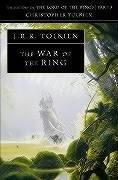Paperback, 496 pages
English language
Published March 4, 2002 by HarperCollins Publishers.
The History of The Lord of the Rings, Part Three (The History of Middle-Earth, Vol. 8) History of Middle-earth (8)

Paperback, 496 pages
English language
Published March 4, 2002 by HarperCollins Publishers.
The War of the Ring is the third volume of The History of The Lord of the Rings and the eighth volume in The History of Middle-earth.
The War of the Ring takes up the story of The Lord of the Rings with the Battle of the Hornburg and the drowning of Isengard by the Ents, continues with the journey of Frodo, Sam and Gollum to the Pass of Cirith Ungol, describes the war in Gondor, and ends with the parley between Gandalf and the ambassador of the Dark Lord before the Black Gate of Mordor.
In describing his intentions for The Return of the King, J.R.R. Tolkien said that 'It will probably work out very differently from this plan when it really gets written, as the thing seems to write itself once it gets going'; and in The War of the Ring totally unforeseen developments that would become central …
The War of the Ring is the third volume of The History of The Lord of the Rings and the eighth volume in The History of Middle-earth.
The War of the Ring takes up the story of The Lord of the Rings with the Battle of the Hornburg and the drowning of Isengard by the Ents, continues with the journey of Frodo, Sam and Gollum to the Pass of Cirith Ungol, describes the war in Gondor, and ends with the parley between Gandalf and the ambassador of the Dark Lord before the Black Gate of Mordor.
In describing his intentions for The Return of the King, J.R.R. Tolkien said that 'It will probably work out very differently from this plan when it really gets written, as the thing seems to write itself once it gets going'; and in The War of the Ring totally unforeseen developments that would become central to the narrative are seen at the moment of their emergence: the palantir bursting into fragments on the stairs of Orthanc, its nature as unknown to the author as to those who saw it fall, or the entry of Faramir into the story ('I am sure I did not invent him, though I like him, but there he came walking into the woods of Ithilien').
The book is illustrated with plans and drawings of the changing conceptions of Orthanc, Dunharrow, Minas Tirith and the tunnels of Shelob's Lair.